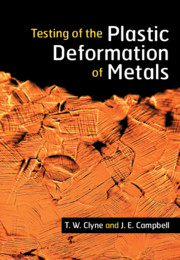Book contents
- Testing of the Plastic Deformation of Metals
- Reviews
- Testing of the Plastic Deformation of Metals
- Copyright page
- Contents
- Preface
- Nomenclature
- 1 General Introduction
- 2 Stresses, Strains and Elasticity
- 3 Continuum Plasticity
- 4 Mechanisms of Plastic Deformation in Metals
- 5 Tensile Testing
- 6 Compressive Testing
- 7 Hardness Testing
- 8 Indentation Plastometry
- 9 Nanoindentation and Micropillar Compression
- 10 Other Testing Geometries and Conditions
- Index
- References
9 - Nanoindentation and Micropillar Compression
Published online by Cambridge University Press: 24 May 2021
- Testing of the Plastic Deformation of Metals
- Reviews
- Testing of the Plastic Deformation of Metals
- Copyright page
- Contents
- Preface
- Nomenclature
- 1 General Introduction
- 2 Stresses, Strains and Elasticity
- 3 Continuum Plasticity
- 4 Mechanisms of Plastic Deformation in Metals
- 5 Tensile Testing
- 6 Compressive Testing
- 7 Hardness Testing
- 8 Indentation Plastometry
- 9 Nanoindentation and Micropillar Compression
- 10 Other Testing Geometries and Conditions
- Index
- References
Summary
Mechanical testing on a very fine scale, particularly indentation, has become extremely popular. Sophisticated equipment has been developed, often with accompanying software that facilitates the extraction of properties such as stiffness, hardness and other plasticity parameters. The region being tested can be very small – down to sub-micron dimensions. However, strong caveats should be noted concerning such measurements, particularly relating to plasticity. Some of these concern various potential sources of error, such as the effects of surface roughness, oxide films, uncertainty about the precise geometry of the indenter tip etc. Moreover, even if these can be largely eliminated, extraneous effects tend to arise when (plastically) deforming a small region that is constrained by surrounding (elastic) material. They are often grouped together under the heading of “size effects,” with a clear tendency observed for material to appear harder as the scale of the testing is reduced. Various explanations for this have been put forward, some based on dislocation characteristics, but understanding is incomplete and compensating for them in a systematic way does not appear to be viable. A similar level of uncertainty surrounds the outcome of fine scale uniaxial compression testing, although the conditions, and the sources of error, are rather different from those during nanoindentation. Despite the attractions of these techniques, and the extensive work done with them, they are thus of limited use for the extraction of meaningful mechanical properties (related to plasticity).
- Type
- Chapter
- Information
- Testing of the Plastic Deformation of Metals , pp. 192 - 218Publisher: Cambridge University PressPrint publication year: 2021

